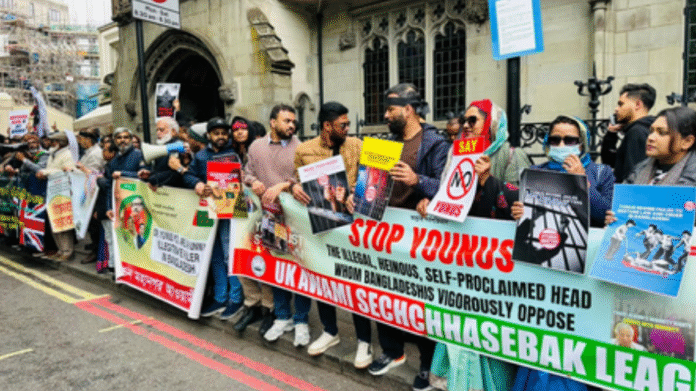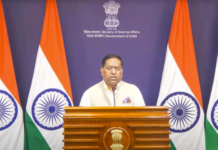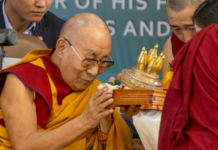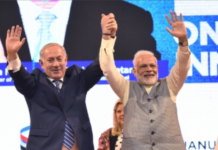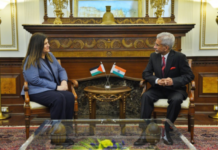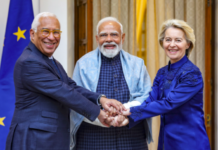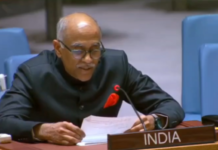London– Muhammad Yunus, the controversial interim leader of Bangladesh, was met with large-scale protests as he began a four-day visit to the United Kingdom on Tuesday. Demonstrators gathered at Heathrow Airport and outside his hotel in Central London, voicing strong opposition to his unelected leadership and accusing him of undermining democracy in Bangladesh.
Protesters, many waving black flags and carrying signs denouncing Yunus as a “killer of freedom fighters” and a promoter of radicalism, chanted slogans such as “Go back, Yunus!” The demonstrations, led primarily by members of the UK-based Awami League community, also demanded the release of Hindu priest Chinmoy Krishna Das, who is currently detained in Bangladesh. Some eyewitnesses reported that shoes and eggs were thrown at Yunus’s convoy as it traveled from the airport to his hotel.
Demonstrators pledged to continue their protests throughout Yunus’s visit, with plans to demonstrate outside Chatham House on Wednesday and hold an all-day rally near the UK Parliament on Thursday. They have also expressed strong disapproval of a reported meeting between Yunus and UK Prime Minister Keir Starmer, arguing that any official recognition of Yunus lends legitimacy to what they consider an unconstitutional regime.
In a formal letter addressed to Downing Street, the Speaker of the House of Commons, the King’s Foundation, and the Commonwealth Secretariat, the UK branch of the Awami League urged British leaders not to recognize Yunus’s government. The letter criticized the UK’s engagement with a regime accused of escalating political repression, economic mismanagement, and widespread human rights abuses, particularly targeting women, girls, and religious minorities.
“Tensions have intensified following the Yunus administration’s banning of the Awami League,” the letter stated. “This move represents a dangerous deviation from democratic norms. The Awami League, one of Bangladesh’s founding political parties, continues to enjoy the support of tens of millions, including members of the global diaspora.”
Yunus recently announced that general elections would be held in April 2026. However, critics argue that without the Awami League’s participation, the election would lack legitimacy. Concerns over press freedom have also grown under Yunus’s leadership, with at least 140 journalists facing politically motivated charges and many others arrested for supporting the opposition.
According to Human Rights Watch, the Bangladeshi government has increasingly relied on vague or mass criminal complaints to facilitate arbitrary arrests—most targeting Awami League supporters. The political turmoil has been compounded by a student-led protest movement, resulting in widespread violence and instability. More than 2,000 attacks against Hindus and other minorities have been recorded in the past several months, and reports indicate a sharp rise in gender-based violence and child abuse.
Bangladesh’s economy, once hailed for its rapid growth and poverty reduction, has also suffered under Yunus’s interim administration. The International Monetary Fund recently downgraded the country’s GDP growth forecast from 5.1% to 3.3%, citing civil unrest, policy uncertainty, and declining investment. The IMF has warned the Yunus government to improve governance, transparency, and ensure that its legal reforms meet international standards.
“It is both ironic and troubling that an unelected leader is visiting the birthplace of modern democracy and expecting a red-carpet welcome,” said Mohd. Arafat, a spokesperson for the Awami League. “This visit risks deepening unrest in both the UK and Bangladesh. By legitimizing such a government, Prime Minister Starmer could jeopardize the UK’s global reputation as a defender of democratic values.”
Arafat called on British authorities, including the monarchy, to pressure Yunus to ensure free and fair elections, lift the ban on the Awami League, and restore multi-party democracy in Bangladesh.
Adding to concerns is the growing influence of the Islamist party Jamaat-e-Islami among the Bangladeshi diaspora in the UK. In April, Jamaat leaders reportedly met with Bangladesh Nationalist Party (BNP) Chairperson Khaleda Zia and her son Tarique Rahman in London.
On Friday, Yunus is scheduled to meet with BNP representatives at his London hotel, according to the party’s Secretary General Mirza Fakhrul Islam Alamgir. Meanwhile, around 60 to 70 Jamaat supporters gathered outside the hotel on Tuesday with signs welcoming Yunus.
As Yunus continues his UK tour, the protests show no sign of slowing—underscoring the political polarization and uncertainty that currently grips Bangladesh. (Source: IANS)


